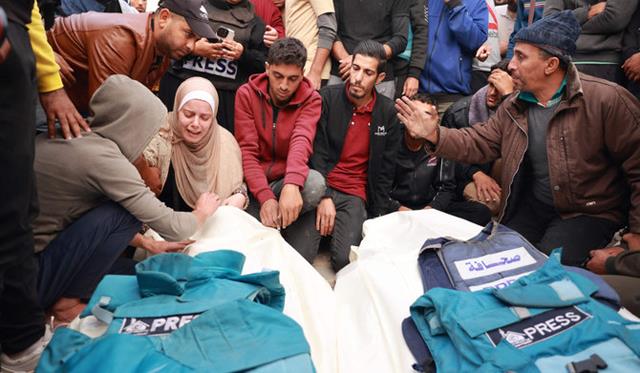
IFJ Nominates Palestinian Journalists' Syndicate For Global Press Freedom Prize
In the nominating statement on its website, IFJ said,“Since 7 October 2023, foreign journalists have been barred from the Gaza Strip. All the sounds, words and pictures broadcast from the enclave have come from approximately 1,000 Gazan journalists - around 10 per cent of whom have now lost their lives. The PJS counts as members around four fifths of Gaza's media workers. This nomination honours them all, via the union that has supported them all, regardless of membership. Gaza's journalists have little food, water and fuel. Most are homeless and struggle to obtain such basic necessaries as clothing, bedding and tents. Their mortality rate is without precedent. Nearly all have lost loved ones.”
“Despite this, Gaza's journalists have continued to film, record, describe and document what has happened to their communities. No group of journalists have paid so heavily to inform so many. PJS' support work builds on many years defending and promoting a free press in Palestine,” the statement said.
The annual UNESCO/Guillermo Cano World Press Freedom Prize was created in honour of Guillermo Cano, a Colombian journalist who was assassinated in the line of duty in 1986. Created in 1997, this Prize is awarded annually to a person, organisation or institution that has made a notable contribution to the defence or promotion of press freedom, especially if risks have been involved.
The laureate of this year's prize will receive $25,000 and a medal at a ceremony scheduled to take place on World Press Freedom Day on 3 May 2024.
IFJ Deputy General Secretary Tim Dawson said:“Amid the unfolding horror of the war in Gaza over the past five months, the enclave's journalists have been the only ones able to project a view of events for the rest of the world. During that period, their union, of which the vast majority are members, has played a unique role, sustaining and supporting all those brave reporters. Recognising that role would be an apt way to recognise all who documented Gaza's tragedy, as well as honouring the extraordinary number who have payed the ultimate price.”
According to IFJ, at least 96 Palestinian journalists and media workers have been killed, several have been injured and others are missing during the war in Gaza.
FJ General-Secretary Anthony Bellanger said,“Media workers in areas of armed conflict must be treated and protected as civilians and allowed to perform their work without interference. The IFJ calls on all combatants in this conflict to do their utmost to safeguard journalists and media professionals. There is intense and deeply concerned interest in this conflict all round the world, but people will only be able to understand what is really going on if journalists are allowed to do their work.”
Brussels-based IFJ had declared February 26 the International Day in support of Palestinian journalists. Press associations around the world, including in Jordan, organised activities on February 26 in solidarity with Palestinian journalists.
The Committee to Protect Journalists (CPJ) has committed $300,000 in emergency funds to support Palestinian journalists to ensure that they have access to basic supplies at this crucial time.
CPJ said in a recent statement that the funds were being disbursed via local and regional organisations, namely the PJS.
“The aim of CPJ's assistance and implementation through these local organisations is to ensure that journalists inside Gaza remain safe and able to continue bringing the news from the frontlines to the rest of the world,” the organisation said in the statement.
By late January 2024, CPJ said it had documented the killing of more than 80 journalists and media workers in the conflict, the majority of them Palestinian reporters trapped inside Gaza.
CPJ's reporting also points to“ongoing press freedom violations” across the occupied West Bank against journalists reporting on the war, including assaults, arrests, information blackouts and the killing of family members.
“Amid continuous airstrikes and the blocking of international journalists from entering Gaza, local journalists are on the frontlines of this story as they try to survive every day. Like much of the civilian population of Gaza, Palestinian journalists are struggling to cope with food, fuel, and water shortages while lacking access to protective gear and sometimes unable to recharge their phones or replace their damaged equipment.”

Legal Disclaimer:
MENAFN provides the
information “as is” without warranty of any kind. We do not accept
any responsibility or liability for the accuracy, content, images,
videos, licenses, completeness, legality, or reliability of the information
contained in this article. If you have any complaints or copyright
issues related to this article, kindly contact the provider above.


















Comments
No comment